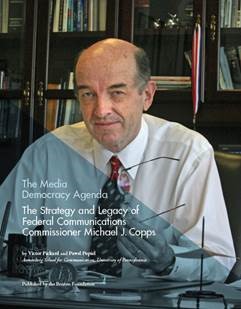Victor Pickard
Another Internet Is Possible—If You Believe It Is
The internet is facing multiple crises. From algorithmically fueled misinformation on Facebook to communities abandoned by large internet service providers, the tension between digital monopolies’ profit interests and the public interest is glaringly evident. Consensus is growing that the internet we have is not the internet that we want or need. In recent years, a diverse array of thinkers has begun to coalesce around bold ideas for radically democratizing the internet—from the pipes that connect us to the internet to the platforms that distribute news and information.
Against Digital Redlining: Lessons from Philadelphia’s Digital Connectivity Efforts during the Pandemic
Internet service providers’ discriminatory underinvestment in broadband infrastructure and services—referred to as “digital redlining” for disproportionately affecting low-income communities of color—is drawing increased public scrutiny, including from policymakers.
The Great Reckoning: Lessons from 1940's media policy battles
The early broadcast era and our current platform era bear some striking resemblances, but one parallel looms large: In the 1940s, we lost a key battle to build a potentially liberating and wondrous medium—and we are on the cusp of doing so again. Then as now, commercial operators defined the terms by which we could use our core communication and information infrastructures. Democratic oversight, public alternatives, and social responsibilities were kept to a minimum. Democratic societies must now fight to prevent this from happening again.
Biden’s Broadband Plan Is a Good Start—but America Needs Guaranteed Broadband for All
President Biden’s proposal to expand high-speed Internet access as part of his infrastructure bill affirms that broadband is an essential public service. It embraces the government’s responsibility to counteract the market’s failure to provide adequate Internet access to millions of Americans. By prioritizing universal service, it offers a glimpse of what a more democratic Internet might look like.
Coronavirus Is Hammering the News Industry. Here’s How to Save It.
Tens of thousands of journalists are losing their jobs, newspaper chains are going under, and vulture capitalists are picking over the remains. We need a news bailout — but one that overhauls the existing corporate model and pushes the media to put the public before profits. Journalism needs more than just stimulus; it needs a major structural overhaul. And it requires permanent and public support.
Cities and states take up the battle for an open internet
States and local governments may be able to mandate their own network neutrality rules. Governors in six states – HI, MT, NJ, NY, RI, and VT – have already signed executive orders enforcing net neutrality by prohibiting state agencies from doing business with internet service providers that limit customers’ online access. Four states have passed their own laws requiring internet companies to treat all online content equally: CA, OR, WA, and VT.

Bringing the FCC to the People and the People to the FCC
"Our media is precious. It’s how, outside of our strictly personal spheres, we speak to each other, inform each other, learn from each other, entertain each other, increasingly how we govern ourselves." With these words, Michael Copps opened a public hearing on media ownership rules. The hearing was not in Washington, DC, but Chicago, Illinois. Copps was not a local official, but a commissioner at the U.S. Federal Communications Commission (FCC).

The Media Democracy Agenda: The Strategy and Legacy of FCC Commissioner Michael J. Copps
This report, part history, and part strategy playbook, examines the tactics and policy priorities of former-Commissioner Michael J. Copps during his 10 years at the FCC. An analysis of Commissioner Copps’s tenure, his political strategies, and his legacy is a timely endeavor, both for its historical importance and for its contemporary relevance. As a commissioner in the minority during the George W.
This report, part history and part strategy playbook, examines the tactics and policy priorities of former-Commissioner Michael J. Copps during his 10 years at the FCC. An analysis of Commissioner Copps’s tenure, his political strategies, and his legacy is a timely endeavor, both for its historical importance and for its contemporary relevance.

It’s Not Too Late To Save Net Neutrality From a Captured FCC
[Commentary] In many ways, network neutrality is a secondary problem. Until we confront core injustices stemming from unregulated monopoly power—which may worsen given the likelihood of massive media mergers—we can’t address issues like slow broadband speeds, outrageously high prices, digital red-lining, and the woeful lack of competition in Internet service markets.
Killing net neutrality is a top-down corporate power grab. There’s absolutely no need to repeal it. The protection has tremendous public support. As the Federal Communications Commission serves a narrow corporate agenda, we must find a way to recapture it for the people. The Internet is too valuable to leave to the mercy of monopolies. The battle for net neutrality continues. It’s a battle we can and must win.
[Victor Pickard is an Associate Professor of Communication at the Annenberg School for Communication.]

